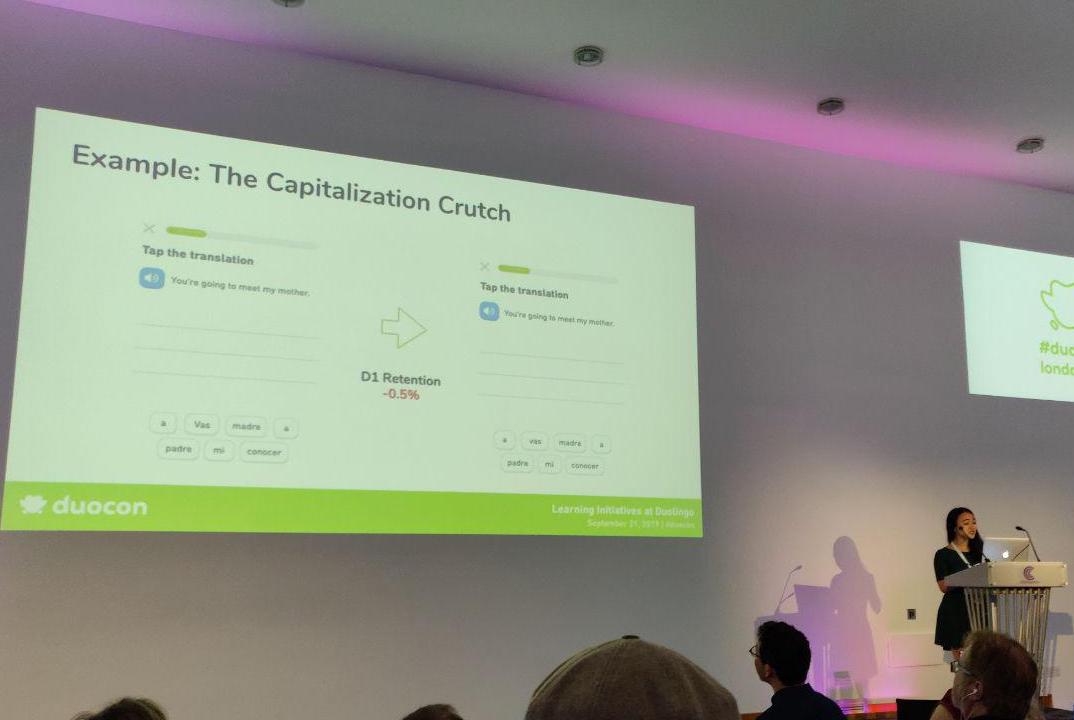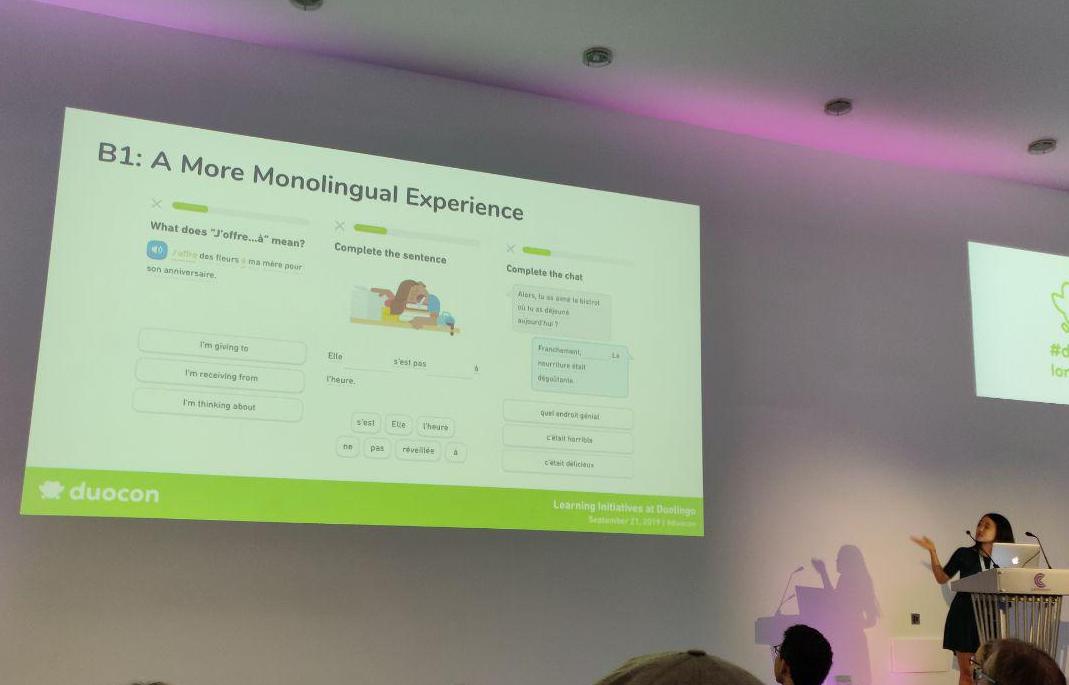In my previous post I started writing about how I attended my first ever Language conference, Duocon, but I didn’t go into any details about its content. In this post I’ll talk about Luis von Ahn’s presentation was about multiple broad aspects of Duolingo and its mission of free education and Karin Tsai’s presentation on teaching a language efficiently.
Duocon’s Keynote
Luis went through some financials of the company, its late venturing into some types of marketing campaigns, the demographics of some courses and recent initiatives such as tackling the problem of costly language certification exams.
I already mentioned in the first post of this series why I admire Luis von Ahn, so I won’t repeat myself here. During his talk he was very vocal and personal about his belief that education should be free and how it can impact people’s lives, but in addition to that he showed us proof that this is also a great business model. Duolingo’s course content is entirely free, but has a paid subscription that adds some small features such as removing ads and downloading lessons for offline mode. I would argue that downloading lessons for offline mode should also belong to the free plan since poverty can impact one’s access to constant data. Personally, I only paid for Duolingo Plus because it is free to everyone else and I liked how non-instrusive their ads were. It seems a paradox that I would pay to remove something that was not on my way, but the fact that it is so clearly obvious that they make an effort to be ethical with their ads that this makes me want to give them money when I can. Either way, it was really interesting to learn that only 2% of Duolingo users pay for Duolingo Plus, but the revenue from that is far superior to the revenue from ads. It is also far superior to the 100% of users of each other education app that charge for their content, since Duolingo is the top grossing education app in both the Apple and Play stores.
One of the contrarian views we hold at @duolingo is that allowing people to learn entirely for free is not only good for the world but good for our business. Our app is the top grossing app among all education apps worldwide, even though the others charge for learning.
— Luis von Ahn (@LuisvonAhn) October 2, 2019
Another point of his talk that stood out to me were his comments on language certification and Duolingo’s approach to them. Having been born in a country whose official language is Portuguese and having moved through 3 more countries, I have been victim of this scheme multiple times. There is a number of things language certification exams are used for such as access to universities and immigration, and a number of reasons why they are hugely expensive, not to mention the addition of travel costs. To put it mildly, language certs are a big social and educational gatekeeper. I personally think it’s nothing less than fantastic that Duolingo is aware of this fact and working to solve this. There are different ways where you can try to reduce the certs price such as by allowing the student to take it online at their convenience. But there are other things you have to work through like making sure the identification of the person actually taking the test is correct and figuring out how to make an accurate assessment of language in a shorter period of time, and it seems they also solved these ones. One other issue they are approaching with reasonable success at the moment is getting their certification accepted by institutions. My belief (and hope) here is that they will gradually expand with great success in this area.
There are still some unsolved problems. One of them is anti-cheating measures. I was surprised to learn that their exam still requires a human to observe the exam takes. Needing people to verify the tests is an obvious blocker to even further price reduction. The current price of the Duolingo English certification is 50$ which seems very modest and so much cheaper in comparison with other certifications, but that is still 20% of a monthly salary in Brazil. Finding a way to scale this non-linearly sounds like an extremely interesting problem to tackle.
Learning efficiency
Karin Tsai is a Senior Engineering Lead at the learning area and one of Duolingo’s early employees. She talked about the various challenges Duolingo’s product faces, how the incubation of new course works, teaching efficiently without driving users away, and new features coming up at Duolingo that will improve it in different areas.
I have been public about how I find Duolingo’s and other similar apps efficiency in teaching languages questionable, for different reasons. It was however, extremely enlightening to listen the product creation perspective. Especially the data-driven approach to not driving users away. As a Software Engineer who is extremely familiar with the concept of A/B testing and how surprising the impact of some minimal changes can be, it was really curious to see the result of some of their experiments. For example: they intuitively imagined that the capitalization of the first word of the sentence (which was maybe initially there because of a bug) would make the lesson too easy or boring, but careful examination showed they were incorrect about that, and users prefer to have that tip and stay more engaged in learning. Despite any criticism that I may have, I have to concede that engagement is extremely important in language learning. In the end, putting time and effort has to factor in. Even when you want to be more efficient and teach in less time, you can’t do this by damaging the engagement of the users enough to make them want to study less. Some balance is necessary there.

I am also very skeptical of their translation-based approach, I have written about this on twitter and will save a better elaboration on this for a future post. They seem to be aware of its caveats especially as you move towards more advanced stages in your learning process. For example, you’ll start encountering words or idioms without direct translations or multiple possible interpretations. This also means that it is hard for them to keep using this approach, from a computational complexity perspective. I was really happy to learn that they already have improvements coming in to address that. They are expanding several courses to include new types of lessons such as monolingual tasks with more careful interpretation and working on more personalized learning. Their example of monolingual tasks seemed super interesting and involved things like text interpreting questions, for example. These improvements come in conjunction with a task-force to make their courses CEFR aligned, which in my opinion is also excellent news.

One other very interesting point of her talk was how they measure how users are actually improving their language. It seems it is possible to do that with very few questions, which they tag with something called “communicative component” (what’s that question supposed to measure) and they take the progression between levels as an opportunity to inquire that through the Castle Quiz. I personally think that’s an excellent idea because one other way to have measured that would be just checking how the accuracy of the users increase over time. But an improvement in that metric could just mean getting more used to the game mechanics and wouldn’t tell them much about what subjects they are good at teaching and what could be improved.
Other things mentioned were features already present on the web version being transferred to the mobile version of the app, like Duolingo Stories and the lightbulb tips. One other thing mentioned I really liked to hear is that they are planning on giving more guidance through the curriculum like bringing cracked skills back and helping us find what’s the best time to learn a new skill or to improve existing skills.
Despite all of these upcoming improvements there are still many challenges that remain unsolved. One of them is related to a common complaint I hear from people using language-learning apps which is really helping us being communicative with the language. Especially as we become more advanced. Karin referred to this as “creative production”. Honestly, even though I had completed their whole German course I felt very unprepared to have conversations. That was however a long time ago, before they introduced crowns. They since have expanded the course, but creative production remains a challenge. Duolingo had one feature intended to tackle this problem, the Chatbots, but they have been removed temporarily last year and have not yet returned. Some people loved this feature (I didn’t benefit from them particularly), but as far as I understood the Chatbots were not ideal and were not working well. I didn’t quite understand what exactly was not working (in more general terms). My personal experience with their Chatbots when I had the opportunity to use them is that they were rather rudimentary, at least for the level of language I had at the time. They were also less of a free chat and more of a formulaic dialogue orientation. Perhaps more useful for very beginners but not for everyone?
As someone who studied AI, I understand this is an extremely difficult problem to solve. Maybe we just aren’t at the point at to apply Chatbots to language learning and this requires some more years of research and technological advancement. Although I have heard of other companies working on them, I haven’t yet seen any released apps, and especially not free, that provided useful bots for this domain. The closest I’ve heard of was this alexa-looking robot that teaches you chinese. The video looks super interesting, but the price point is certainly not accessible to anyone and it doesn’t look like they’ve shipped any yet. It’s still in prototype phase and I’ll remain skeptical until I see one.
Some parts of the audience had a question, that was more of a comment, that was more of a very long comment, but I was overall extremely happy with this talk and am so looking forward to the many upcoming improvements mentioned. I am definitely excited to try using Duolingo for German again as soon as these new features are in.
Just as a reminder, I am writing this from memory so if you attended the conference and found any mistakes above, please let me know!
In my next post, I’ll talk about why I learn languages as I discuss David J. Peterson’s (who created the languages High Valyrian and Dothraki for the show Game of Thrones) presentation on the usefulness of languages.
